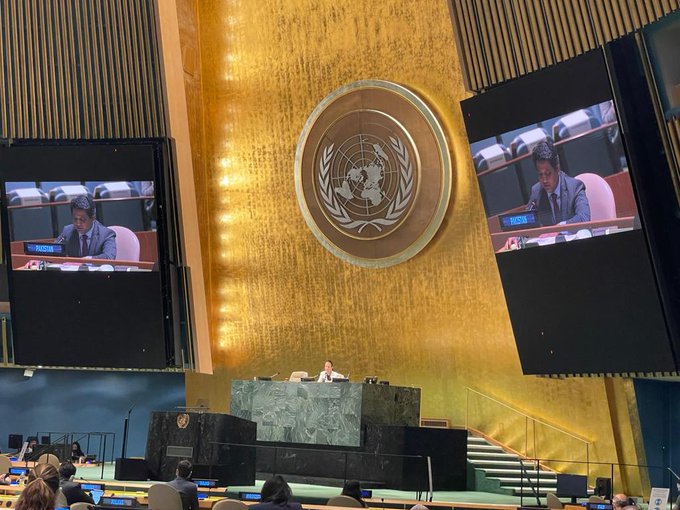UNITED NATIONS, Pakistan has called for global solidarity to counter growing religious and racial discrimination, xenophobia and Islamophobia as well as hate speech through effective legal measures, saying the coronavirus pandemic had further exacerbated those trends.
“Today, one of the most concerning emerging trends in global terrorism is in the form of terrorist attacks on the basis of racism, xenophobia, intolerance, Islamophobia or other forms of intolerance, by violent nationalist, supremacist, far right, and other such groups and ideologies in many parts of the world,” Ambassador Aamir Khan, acting Pakistani permanent representative to the UN, told the Second High-level Conference of Heads of Counter-Terrorism on Monday.
The terrorist threat posed by such groups and ideologies must be addressed “decisively and robustly”, he said.
In this regard, the Pakistani envoy called for making appropriate changes in the global counter-terrorism architecture and UN Security Council sanctions regime, for including supremacist groups such as Rashtriya Swayamsevak Sangh (RSS) which, he said, had committed heinous crimes against Muslims.
Aamir Khan stressed the need for a comprehensive assessment of the emerging threats and trends in global terrorism, including the impact of the new technologies, is vital for the success of the international community against this scourge.
While this trend is not new, he said, the international community is only slowly recognizing the magnitude of this threat, and that the recent Islamophobic terrorist attacks across the world are yet another wake-up call for the international community.
“The COVID-19 pandemic, unfortunately, has further exacerbated intolerance, discrimination, racism, and violence against religious minorities and immigrants, in certain parts of the world, with such terrorist groups capitalizing on the pandemic to spread hatred and conspiracy theories, including through internet and social media platforms,” the Pakistani envoy said.
The transnational threat from nationalist and supremacist groups and individuals has also increased in the backdrop of the pandemic.
The Pakistani envoy recommended greater focus of the relevant UN counter-terrorism entities on understanding the threat posed by such groups in context of global terrorism as well as for building effective counter-narratives
Opening the conference, UN Secretary General Antonio Guterres warned that despite progress in the fight against terrorism, the threats continue to persist and diversify.
By exploiting social grievances and gender stereotypes, “The fight against terrorism has itself caused damage”, inspiring lone actors and co-opting other groups, he said.
Recounting “especially alarming” advances of Al-Qaeda and ISIL terrorist fighters in Africa, he upheld the importance of supporting the continent as “a global priority”.
The top UN official expressed deep concern over foreign terrorist fighters and underscored the need to hold them accountable.
He also drew attention to the fate of the tens of thousands of relatives, women and children who are associated with them, urging Member States for their repatriation, particularly the children “who remain stranded in conflict zones”.
Amidst some “slow and not comprehensive” progress, Guterres said, “the situation is dire”.
At the same time, years of increasing polarization and a normalization of hate speech have benefited terrorist groups.
“The threat stemming from white supremacist … and other ethnically or racially motivated movements is increasingly transnational”, stated the UN chief. And terrorist groups are exploiting the COVID-19 pandemic.
He also highlighted that misogyny, and women’s and girls’ subjugation, is “a common element” of terrorist networks, which requires “pluralist and independent civic space” to counter it.
Finally, counter-terrorism must “rise to the challenges and opportunities of transformative technologies”, according to the UN chief. To this end, technological innovation must be nurtured while mitigating its risks.
“New technologies need to be harnessed responsibly for counter-terrorism, within the framework of the rule of law and human rights”, he said.
The head of the UN Office of Counter-Terrorism (OCT), Vladimir Voronkov, spoke about terrorist challenges in an age of transformative technologies.
“We need urgently to look ahead on how to adjust our counter-terrorism efforts to respond to new realities and emerging threats”, Voronkov told the conference.
As digitally-enabled technologies transform societies and economies, they present both opportunities and risks.
“We have the means and … responsibility to work together to ensure safe and effective use of technology and prevent its use for terrorist purposes”, concluded the OCT chief.
General Assembly President Volkan Bozkir noted that the initial hope was that the COVID-19 pandemic would deter terrorist groups and lockdowns restrict their movements, “it seems that terrorist groups, have quickly adapted to this new landscape”.
He called for global solidarity against the rise of xenophobia, racism and intolerance, stressing: “We must be vigilant, and stop hate speech, when it is first uttered – both in person, and online. That is an individual, collective, national, and international responsibility”.
Follow the PNI Facebook page for the latest news and updates.









